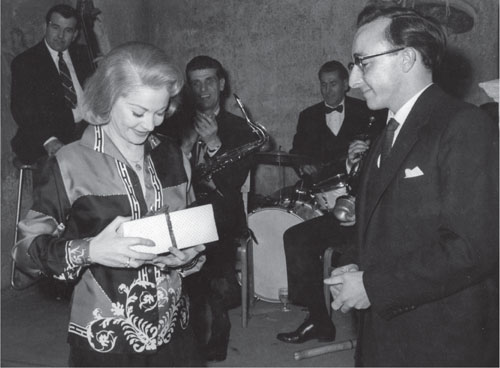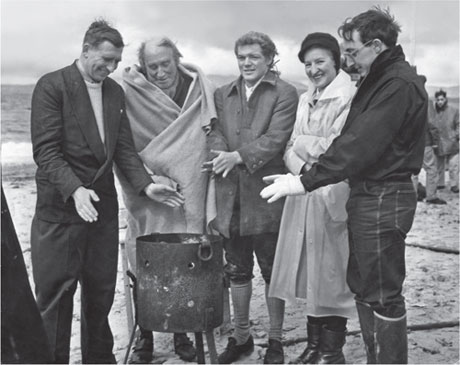Shooting 007: And Other Celluloid Adventures (14 page)
Read Shooting 007: And Other Celluloid Adventures Online
Authors: Sir Roger Moore Alec Mills

Now the only reason I tell this sad account is that later something happened which would eventually change Harry’s attitude towards me personally, damaging our long-standing professional relationship after years of loyalty to each other. Even so, my thanks go to the Robinson family and to other Disney productions; the Mills family now had enough money for a down-payment on Cherry Trees, our new home.
With filming scheduled to start in Rome, Harry suddenly became worried about the cost of air freight, which would not normally be a concern for him. However, this sudden money-saving initiative was put to the production office, with the result that the equipment would now travel to Rome by lorry, with Harry insisting that I travelled in the passenger seat next to the driver, who I well remember had personal problems with BO!
My hotel was close to the Via Veneto, and I was relaxing there in comfort waiting on the unit’s arrival when suddenly I had reason for concern. As I lay on the sun terrace, I noticed someone staring at me, but on making eye contact he at once turned away. Immediately this brought to mind problems other film companies had experienced while filming in Rome, where the Mafia was known to get involved with foreign companies working there, wanting their pay-offs or whatever the local Dons demanded. With this in mind I kept a cautious eye open to see if I was being watched – or was all this my imagination?
Later, a phone call from the production office back in the UK explained that there would be a delay with the unit’s arrival, which would be a few days later than originally planned. Apart from the odd call checking on my safe arrival, so far I had not met or spoken with anyone from the Italian production office, so it would seem that they knew even less about the delay of the English unit than I did. For all I knew they could be the Mafia! Either way, I was not too concerned about the hold-up, which gave me more time to explore the city, starting with a stroll down the Appian Way and twice to the Colosseum
,
casually looking over my shoulder to see if I was being followed. Everyone in Rome now came under my discreet examination …
In the end I would never know the truth about the men in black as the problem would be resolved when I was summoned back to the UK and told to bring all the equipment with me. The schedule had changed, with the Rome experience happening after our filming in Elstree Studios. Life was always full of surprises and suddenly I was to return to England by air, much to the lorry driver’s dismay at losing a return trip and Harry’s frustration at learning that the expense was no longer an issue.
The director of
Roman Spring
, José Quintero, was unknown to many apart from our leading lady, Vivien Leigh. A quiet, gentle human being, Quintero surprised his key technicians on the first morning of filming when he politely explained that he had never directed a film before, nor was he a technical director, and that therefore he would need their support. We would come to see that José’s gift was his ability to get exciting performances from his actors. Later I learned that his directing skills came from working in the theatre and television.
The carefully selected technicians were Harry Waxman, camera operator Ernie Day and Peter Yates, the first assistant director who in time became a director – one of Peter’s best known films is
Bullitt
. Last but not least was June Faithful, an experienced continuity lady. These were the key people who surrounded José on that first morning of filming. The director did not lose his authority through his openness; José instantly held both actors and hardened key technicians in the palms of his hands as they gave in to the director’s genuine honesty. With no ego problems left to deal with, the Quintero chemistry was complete.

The end-of-picture party on
The Roman Spring of Mrs Stone
. I was asked to present Vivien Leigh with a small gift from the company, for which she gave me a kiss. The film’s director, José Quintero, was one of the best I worked with, with the crew enjoying a happy atmosphere throughout the production.
The normal procedure for a film sequence is for the director to run through a scene with the actors, allowing the key technicians to observe how the scene plays out. It happened that the first morning this involved our two stars, Vivien Leigh and Warren Beatty. To satisfy my ever-present curiosity of director/actor relationships I now experienced a demonstration of perfect handling.
Red light on, the stage went quiet; one could hear a pin drop as we watched these two giants of cinema quietly displaying their word-perfect reading of the scene. Possibly an hour passed before José decided that he would like to spend more time with his actors, suggesting everyone else should go for tea in the canteen. Peter Yates duly removed everyone from the set, allowing only the key technicians to remain with José as he continued with his ‘private’ rehearsal. The unit did not need telling twice, and everyone went off to the canteen, knowing that they would be summoned back once they were ready on the stage. Needless to say, I was disappointed with this idea and now came up with a cunning plan, explaining to Peter: ‘I’m bringing tea back for Harry, Ernie and June. Would you like one?’
After delivering the refreshments I quietly melted into the background, silently watching the magic of this director at work with his actors. I believe this was the first time that I honestly appreciated what genuine heartfelt directing was all about – the director’s influence over the actors’ performance, their reaction to his judgement with requests for clarification, before ending up with something truly wonderful. Before the crew were removed to the canteen I had already been impressed with the actors’ reading of the scene, so it had made little sense to me that it was necessary to keep rehearsing these talented people. Not for this director: he expected more from them, convinced there was more still to come.
This was the first morning of filming and the director’s opportunity to develop that all-important building block with his two stars. By the time the rehearsal had finished, Vivien and Warren were both also aware that this man knew his business, their elated faces confirming they could rely on his judgement. They could trust him. Of course, many would claim this was normal for a director, but José Quintero was not looking for normal; he was looking for perfection!
A strong rumour suggested that Vivien Leigh’s contract included the name José Quintero as director for
The Roman Spring of Mrs Stone.
You may also wonder how I know this; the truth is I was a nosey little bugger, though I prefer to call this natural curiosity, especially when listening in to careless conversations whispered near the camera. This was my domain, and it really is amazing what one learns there, as you will read later …
The press reports were generally complimentary about the film, which was the story of an ageing actress (Vivien Leigh) whose husband suddenly dies, leaving her alone in Rome – the perfect scenario for an Italian gigolo (Warren Beatty) to make his move. Harry’s photography of Vivien was simply gorgeous, with a cast including Coral Browne, Jill St John, Carl Jaffe and the fabulous singer Cleo Lane, while not forgetting Lotte Lenya, who won a nomination for best supporting actress.
Roman Spring
gave me an interesting experience of watching the skills of a little-known director’s handling of actors and a lesson in how to win over hard-bitten professional technicians.
Yet, with all this happening, at no time did I have reason to believe this would be the last time that Harry and I would work together. The guv always had my unending loyalty for his support towards me, our professional relationship had never been closer. Should there have been a formal parting of ways,
The
Roman Spring
of Mrs Stone
would have been the film where we would both have chosen to say our goodbyes, particularly in the harmony of Harry Waxman showing such respect to this unknown director.
Harry went off filming with a different camera crew, which by now I had accepted as the norm in our relationship. Past experience suggested that we would get together again on his return. With me now available for work, a surprise call came from Paul Beeson, offering me a film.
It was some weeks later that Harry returned from his latest trip and decided to ignore me for reasons known only to himself. He even went so far as to look the other way, making it difficult to ask why he was acting in this manner. I admired Harry, he knew this, so why this sudden change of attitude towards me? Obviously it could only be due to Paul offering me a film while Harry was away. When
Roman Spring
finished, we had all left on the best terms, so this made little sense, but it would seem that Harry had regarded my working with Paul as my personal disloyalty to him. If so, Harry had seriously misjudged me.
Sadly this juvenile situation continued for some time before Harry’s attitude mellowed – a little – though even with the passing of time this damaged relationship would never be healed completely, leaving another silly situation the guv had created for himself. There was still one brief moment that I would hold on to and remember him by. Eventually Harry managed a smile towards me … from a distance … nothing more. Regrettably, we would never get round to talking about this nonsense before Harry passed away. God bless you, guv! You played an important role in the development of my career. Later I would ask myself if I had also been playing my part in Harry’s ‘private script’ – could this be true of us all?

Working on Robert Louis Stephenson’s
Kidnapped
in 1960. As you can tell, it was high summer in Scotland. James MacArthur (centre) played the role of Davy Balfour; I would work on three films for Walt Disney with James, including
Third Man on the Mountain
and
Swiss Family Robinson
, but he will always be best remembered for his role as Danny Williams in
Hawaii Five-O
. ‘Book him, Danno!’
There are many questions in life to which we will never know the answer. Private relationships don’t necessarily make interesting reading, although later I would reflect on why some influenced me over the years. I believe my experience with Harry was the key that kept my career on course. Paul was a hiccup which did not help matters and Harry unfortunately misread the script, not understanding that I only chose to work with Paul – someone I hardly knew – while the guv was away. Suddenly I found myself standing between two stools with all this nonsense making little sense to me.

